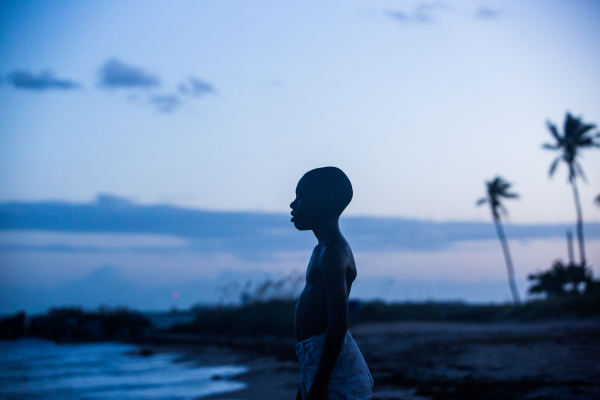Moonlight Review

Belonging, love, identity – not everyone grows up a gay black man with a drug addict mother and no father like Chiron, the main character in Barry Jenkins’ “Moonlight,” but his struggle to find and be himself resonates across all lines of race, gender, ethnicity and sexual orientation.
A coming-of-age story in three parts, “Moonlight” gives us a glimpse into critical periods in Chiron’s life, each stage portrayed by a different actor. Alex R. Hibbert plays 9-year-old Chiron, a.k.a. “Little,” a quiet boy who gravitates toward a local drug dealer (Mahershala Ali) to escape being bullied at school and ignored by his mother (Naomie Harris); Ashton Sanders plays teenage Chiron, a near-brooding adolescent forced to face who he is and can become; and Trevante Rhodes plays “Black,” a physically transformed but still emotionally fragile Chiron as a young adult.
What it took Richard Linklater more than a decade to accomplish in 2014’s “Boyhood,” Jenkins does in a film that’s an hour shorter and was shot in something like three weeks. Nothing can substitute watching a character actually age before your eyes, but the three actors who play Chiron all seem to share his essence. Of the many things Jenkins does well in this film, ensuring Chiron’s soul comes through so authentically in all three performances is one of the more underrated.
As an ensemble, the cast of “Moonlight” ranks among the year’s best if not the year’s best period. The film’s roots as a play (written by Tarell Alvin McCraney but never produced) assure the actors some powerful dialogue and scene work. The dialogue drives the drama, as do the unspoken relationship dynamics. Only a few scenes, mostly in the second act, have a distinct physicality to them, otherwise it’s Jenkins who must utilize the camera to facilitate conflict, tension and feeling.
Jenkins experiments with a whole host of techniques, mostly visual but also in the form of Nicholas Britell’s fragmented orchestral score, which sneaks in and out of the film as emotional punctuation, and in many instances completely disappears to leave the viewer with contemplative silence. There’s an intimacy to Jenkins’ approach and to the story as a whole that the film’s vignette structure would seem to prohibit, but Jenkins is able to generate a profound amount of sympathy for Chiron almost instantaneously. His quiet, non-verbal nature in all three life stages gives us ample time to consider his point of view and participate in his journey of self-discovery.
All three acts of the film possess moments of tenderness, optimism and heartbreak, sometimes simultaneously. It speaks to the fragility of life for Chiron, who has the bare essentials to rely on but little else, and how so often the things that leave the biggest imprints on our lives are both good and sad. We even get a sense of just how true this through the only other character who appears in all three acts, Chiron’s mother. Even though the role is fairly small, Harris is able to give a full sense of the mother’s journey too, and brings complexity to a character who’s otherwise easy to despise.
We can safely say that Chiron’s story, background and experiences will be unlike those of most people who see “Moonlight.” Often times even the best movies that feature characters and situations we know exist but are so different from our own create a safe amount of distance, that is to say the viewer gets to observe, seemingly from afar, what life is like some kind of “other.” We leave the viewing experience feeling better educated about and more compassionate toward those whose realities most resemble that film’s story.
“Moonlight,” however, erases more of that distance than films of a similar premise. Jenkins creates an intimacy by telling the story in a way that taps into the most universally human aspects of the story. We’ve seen stories like it done before countless times, but Jenkins changes how we watch “Moonlight” by bringing us closer to everything, to the point that we get more tangled up in Chiron (all three of them) and see parts of ourselves, our lives and our experiences in this poor, black, gay, young man from Miami.
4.5/5 Stars
Moonlight
Directed by Barry Jenkins
Written by Barry Jenkins, Tarell Alvin McCraney (story)
Starring: Alex R. Hibbert, Mahershala Ali, Naomie Harris, Ashton Sanders, Trevante Rhodes






0 Comments
You can be the first one to leave a comment.